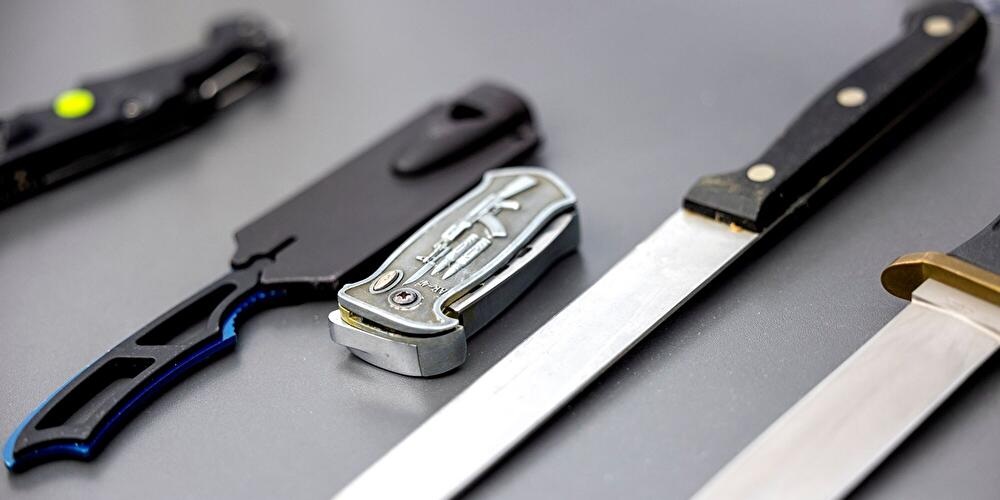Starting on Thursday, July 17, Berlin will implement stricter regulations regarding the possession of knives and other weapons in public spaces.
This move follows a noticeable increase in violent crimes involving knives, marked by several high-profile incidents across Germany.
The new measures aim to enhance public safety by reducing the prevalence of dangerous weapons in everyday environments, particularly on public transport.
However, the regulations also empower police officers with broader authority to conduct searches without needing specific suspicion, raising questions about civil liberties alongside security improvements.
The core component of the updated regulations is a comprehensive ban on knives across all forms of public transportation within Berlin.
This prohibition applies universally, irrespective of blade length, meaning that even small or folding knives are not permitted.
The ban covers the S-Bahn and U-Bahn subway networks, trams, buses, as well as train stations and bus stops.
Because this ban is universal and not restricted to clearly marked zones, authorities will not install separate signage to indicate knife-free areas, simplifying enforcement and public understanding.
The ban extends beyond knives to include firearms, creating a broader safeguard against armed violence in public areas.
This encompasses not only traditional guns but also flare guns and devices designed to fire blanks.
Additionally, irritant sprays such as tear gas, commonly used for self-defense, are now prohibited in these settings.
By including these items, the regulation addresses a wider spectrum of weapons capable of causing harm or inciting panic among commuters and pedestrians.
Despite its broad scope, the law provides certain exemptions to accommodate legitimate uses of knives and related items.
For instance, workers in restaurants, snack bars, or other food establishments located within train stations are allowed to carry knives required for their duties.
Additionally, customers eating on site are permitted to use cutlery while consuming their meals.
Another exception covers the possession of knives “in connection with a generally recognized purpose,” although this provision is somewhat ambiguous and subject to interpretation.
In the context of Berlin’s public parks, where knife bans also apply, carrying a knife for innocuous activities.
Such activities include cutting a birthday cake or slicing fruit like watermelon is likely considered reasonable under this clause.
The law further clarifies that knives not immediately accessible do not fall under the ban.
Specifically, knives that are packaged or securely stored, requiring multiple deliberate movements, defined as more than three hand motions, to retrieve—are exempt.
This distinction aims to differentiate between weapons that pose an immediate threat and items carried for benign reasons but safely stored.
Enforcement responsibility lies primarily with the Berlin police, who will be equipped with expanded powers to uphold the regulations.
Notably, officers no longer need to possess specific suspicion to carry out weapons checks on individuals in public transport areas or stations.
This represents a significant departure from previous requirements, where searches usually necessitated reasonable grounds tied to observed behavior or intelligence.
The ability to perform spot checks broadly is intended to deter weapon-carrying proactively and intercept potential offenders before incidents occur.
If a prohibited weapon is found during an inspection, the consequences can be severe.
Individuals caught carrying banned knives, firearms, or irritant sprays may face fines of up to €10,000.
Such penalties signal the government’s firm stance on curbing violent crime and underscore the seriousness with which these new rules will be enforced.
The prospect of heavy fines is designed to dissuade the public from carrying weapons in restricted areas, contributing to safer urban experiences.
The introduction of these measures comes amid growing public concern over knife-related violence in Berlin and across Germany.
Recent months have seen several incidents involving knife attacks that sparked urgent calls from politicians and community leaders for tougher security protocols.
While the regulations have been welcomed by many as a necessary step toward protecting citizens, some critics raise alarms about the expanded search powers granted to police, fearing potential overreach and impacts on privacy and civil rights.
In summary, Berlin’s new knife and weapon regulations, effective July 17, establish a strict no-weapons policy on public transport and in transport hubs, irrespective of blade size or weapon type.
They include clear exceptions for work-related use and social contexts while emphasizing that visible and easily accessible weapons are prohibited.
Police will carry out increased searches without requiring specific suspicion, backed by fines reaching €10,000 for infringements.
As the city seeks to balance safety concerns with individual freedoms, these regulations reflect a decisive response to recent violent crime trends and underline Berlin’s commitment to creating a safer public environment.



